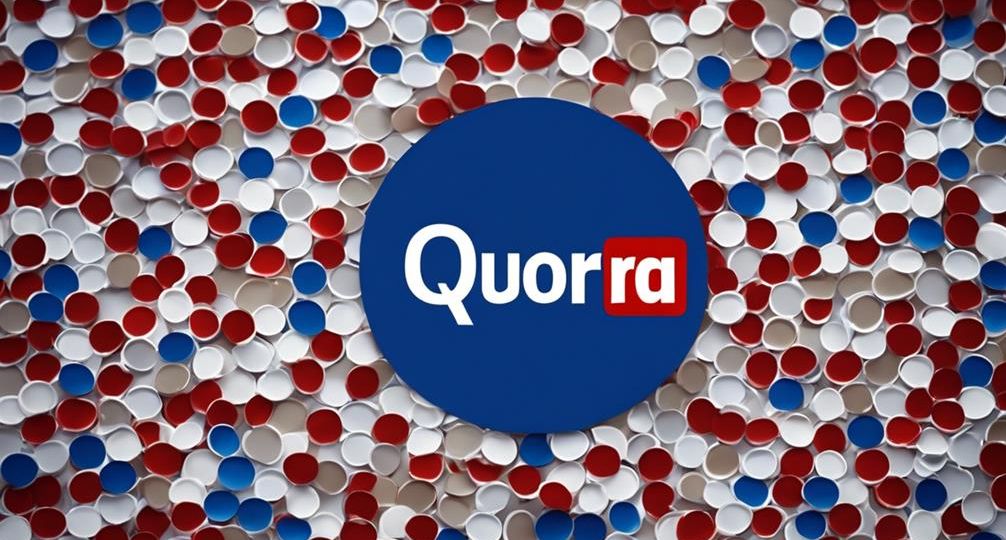
Why is Quora better than Facebook?
You know what they say, ‘quality over quantity,’ right?
Now imagine applying that to your social media usage. With Facebook, you’re likely inundated with endless posts, many of which don’t benefit you.
Yet on Quora, you’re presented with knowledgeable insights and valuable information.
But why is Quora inherently more beneficial, you ask? Well, you might be surprised by the reasons, and they might just change the way you approach social media altogether.
Key Takeaways
- Quora champions intellectual growth with quality discourse and expert insights, contrasting Facebook’s social-centric focus.
- A vigilant moderation team on Quora ensures a spam-free environment and reliable knowledge, enhancing user trust.
- Quora’s privacy features, including anonymity, provide a safe space for open discourse, unlike Facebook’s potentially confusing privacy settings.
- Transitioning to Quora offers benefits such as high-quality content, intellectual stimulation, and a respectful community fostering responsible online behavior.
Understanding Quora and Facebook

To truly appreciate why Quora may be superior to Facebook, it’s crucial to first understand the fundamental differences and unique aspects of these two popular social platforms. Facebook, a social networking site, primarily focuses on connecting you with friends, family, and those with similar interests. It’s a platform where you can share updates, photos, and engage in casual conversations.
Quora, on the other hand, is a question-and-answer forum where you can ask, answer, and read responses on a wide array of topics. It’s a platform that values knowledge-sharing and intellectual discourse.
When it comes to platform usability, Facebook might seem more user-friendly due to its familiar interface. But Quora’s design, focused on simplicity and functionality, can be more appealing to those seeking straightforward answers and in-depth discussions.
The social media impact of both platforms also varies. Facebook’s impact is largely on personal connections and entertainment, whereas Quora influences knowledge acquisition and intellectual growth.
The Nature of Interactions
Let’s turn our attention to the nature of interactions on both platforms.
You may notice that Quora prioritizes quality over quantity in its discourse, leaning more towards intellectual exchanges.
Meanwhile, Facebook’s interactions tend to be more social, often focusing on personal experiences and less on in-depth knowledge sharing.
Quality Over Quantity
When comparing the nature of interactions on Quora and Facebook, you’ll notice a stark emphasis on quality over quantity on Quora. Quora prioritizes content quality and user interactivity, making it a platform for meaningful and productive conversations.
Contrastingly, Facebook often becomes a stream of incessant updates, lacking the depth found in Quora discussions. Below, you’ll find a comparison table to help visualize this difference:
| Quora | ||
|---|---|---|
| Content Quality | High | Variable |
| User Interactivity | Engaged | Passive |
| Rate of Meaningful Interactions | High | Low |
| Use of Expertise | Common | Rare |
| Noise-to-Signal Ratio | Low | High |
This table indicates how Quora values quality of content and interaction, making it a more innovative platform for knowledge sharing and learning. The superiority of Quora lies in its focus on substance, not volume.
Intellectual Versus Social
Digging deeper into the nature of interactions, you’ll find that Quora’s intellectual discourse contrasts sharply with Facebook’s social chatter. This marks a clear distinction in platform preferences, where one is academic and the other, social.
- Quora fosters intellectual growth. It’s a platform for sharing knowledge and sparking insightful conversations. You’ll encounter diverse topics, from quantum physics to classical literature.
- Facebook, on the other hand, focuses on social connections. It’s a space for sharing personal moments, life updates, and popular culture.
- The social impact of these platforms is significant. Quora can expand your knowledge. Facebook can enrich your social life.
Hence, the choice between the two hinges on your preference for intellectual discourse or social interaction. Choose wisely, as the platform you frequent shapes your online experience.
Quality Vs Quantity: User Base

When comparing Quora to Facebook, it’s crucial to analyze the user base in terms of quality versus quantity. Consider the diversity of user profiles, the depth of content, and the levels of interaction on both platforms.
This comparison will provide insights into which platform offers a more meaningful and engaging user experience.
Diverse User Profiles
In assessing Quora’s edge over Facebook, one can’t overlook the sheer diversity and quality of user profiles that the former platform boasts. Unlike Facebook, Quora captures a wide spectrum of user demographics that contribute to its rich profile diversity.
- Professionals: Quora is teeming with professionals from various fields who share expertise, amplifying the platform’s quality quotient.
- Academics: The site attracts academics and students who delve into discussions on everything from quantum physics to philosophy; enriching content quality.
- Curious Minds: Enthusiastic learners and information seekers make up a significant chunk of Quora’s user base, driving dynamic conversations.
These diverse user profiles enhance the quality of interactions, leading to a more beneficial, educational, and satisfying user experience. Quora, in essence, champions quality over quantity.
Content Depth Analysis
Building on the idea of diverse user profiles, let’s now assess Quora’s content depth and compare its quality versus quantity in relation to the user base. With Quora’s focus on content curation, you find in-depth, expert responses to specific queries, compared to Facebook’s broad, user-generated content. This shift promotes a distinct user behavior; Quora users seek knowledge, while Facebook users seek social connections.
| Quora | ||
|---|---|---|
| Content Depth | High | Moderate |
| User Behavior | Knowledge-seeking | Social Networking |
| Quality Vs Quantity | Quality Focused | Quantity Focused |
Quora’s preference for quality over quantity ensures substantial, meaningful content, enhancing user satisfaction. Facebook’s quantity-driven model, however, can lead to content saturation, diluting the overall quality. Thus, for a user seeking depth and quality, Quora outperforms Facebook.
Interaction Levels Comparison
Now, let’s delve into the interaction levels on Quora and Facebook, focusing on the quality and quantity of user engagement.
- Platform Usability: Facebook’s interface is more user-friendly, making it easy for all demographics to interact. However, Quora’s design promotes thoughtful interaction, fostering substantive discussion rather than shallow socializing.
- Quality Vs Quantity: Facebook boasts a larger user base, but Quora excels in the quality of user engagement. Quora users typically seek in-depth knowledge and meaningful discussions, offering a richer interaction level.
- User Demographics: Facebook appeals to a broader demographic, while Quora attracts a niche audience, typically the educated and intellectually curious. This results in a more focused, high-quality interaction on Quora.
This comparison indicates that Quora offers a higher quality interaction, despite its smaller user base.
Relevance of Content on Quora

Diving into Quora’s content, you’ll find its relevance far surpasses that of Facebook due to its focus on specific topics and expert insights. This platform thrives on content personalization and robust information filtering, making it an appealing choice for those desiring tailored knowledge.
Here’s a comparison that’ll give you a clearer picture:
| Quora | ||
|---|---|---|
| Content Relevance | High | Moderate |
| Personalization | Strong | Weak |
| Information Filtering | Efficient | Inefficient |
| User Intent | Learning | Socializing |
Quora’s enhanced relevance is rooted in its ability to hone in on your interests. Unlike Facebook, where your feed may be cluttered with irrelevant posts, Quora’s algorithm works diligently to ensure you’re only shown content that you’ve expressed interest in.
Moreover, Quora’s information filtering system surpasses Facebook’s by a long shot. It sifts through the noise and delivers quality, relevant answers to your queries. This makes Quora an innovative platform for those who desire a more refined, focused approach to information consumption. The relevance of Quora’s content is, without doubt, a significant factor contributing to its superiority over Facebook.
Expertise and Authority
You might notice that Quora possesses a considerable edge over Facebook when it comes to expertise and authority.
The platform’s user base is predominantly knowledgeable, often providing insights that are both substantial and credible.
This makes Quora a more reliable source of information, setting it apart from other social networking sites.
Knowledgeable User Base
One significant advantage of Quora over Facebook is its knowledgeable user base, which often consists of experts and authorities in various fields. Considering user demographics, you’ll find a diverse group of professionals, scholars, and industry leaders on Quora, sharing practical insights and informed perspectives.
Here are three things that make this possible:
- Platform usability: Quora’s user-friendly interface encourages meaningful discussions. It’s simple to ask a question or provide an answer, encouraging a culture of knowledge sharing.
- Expert community: Quora’s community includes accomplished individuals from various fields, ensuring you receive responses from experts.
- Quality control: Quora’s stringent moderation policies ensure the quality of content, fostering an environment where reliable knowledge thrives.
Quora’s knowledgeable user base sets it apart, making it an innovative platform for learning and engagement.
Credible Information Source
Building on Quora’s knowledgeable user base is its credibility as a source of expert and authoritative information. While Facebook often teems with unverified data, Quora’s architecture promotes information verification. You’re more likely to find accurate, reliable content because it’s vetted by subject matter experts. Quora, therefore, avoids the pitfalls of misinformation that plague many social platforms.
In addition, Quora excels in knowledge dispersion. Its Q&A format allows for the spread of information across a wide range of topics, from tech innovation to ancient history. The information shared isn’t just personal opinion but often comes from professionals in the field. This makes Quora an invaluable tool for anyone seeking reliable knowledge in a world awash with data.
Quora’s Focus on Learning

Undoubtedly, Quora’s primary advantage over Facebook lies in its unwavering focus on fostering learning and knowledge sharing. Unlike Facebook, which largely serves as a platform for social interaction, Quora is designed to facilitate intellectual curiosity. With the help of Quora’s algorithms, your feed is personalized to match your interests, ensuring that you’re constantly learning about topics that fascinate you.
Here’s why this focus on learning makes Quora stand out:
- Depth of Discussion: Quora encourages in-depth responses, fostering a culture where users feel compelled to share their knowledge in a comprehensive manner. This leads to much richer content than what you’d find on Facebook.
- Quality of Content: Quora’s algorithms filter content to prioritize informative responses. This ensures that your feed is filled with knowledgeable answers, rather than the often trivial content encountered on Facebook.
- Community of Experts: Quora has established an intellectual community where experts from various fields actively participate. Their insights offer a level of expertise rarely seen on Facebook.
In essence, Quora is a platform for anyone who values knowledge and continuous learning, making it a superior choice for the intellectually curious.
Privacy Features Comparison
Beyond the realm of knowledge sharing, Quora also outshines Facebook in terms of privacy features. It’s important to recognize this when considering the two platforms, particularly in an era where data privacy is a primary concern for many users.
Quora’s data protection policies are robust and transparent. You’re given clear information about how your data is used and stored, and crucially, you’re in control. Quora places a high emphasis on user consent management, ensuring you have the power to decide what personal information you want to share and with whom. This is a stark contrast to Facebook, where privacy settings can often be opaque and confusing.
Furthermore, Quora takes a proactive approach to privacy. You can choose to post anonymously, offering an added layer of protection that Facebook doesn’t provide. This demonstrates Quora’s commitment to fostering a safe environment for open discussion, without the fear of privacy invasion.
User Engagement Levels

When it comes to user engagement, you’ll often find that Quora surpasses Facebook in meaningful interactions. It’s not just about the number of users or time spent on the platform – it’s about the quality of those interactions and the value they bring to the users.
- Engagement Metrics: Quora shines in terms of engagement metrics. Users don’t just scroll and like; they participate in meaningful discussions, answer questions, and share knowledge. This level of interaction is deeper and more fulfilling than the passive content consumption often seen on Facebook.
- User Retention: Quora’s unique approach to user engagement contributes to its impressive user retention rates. Users keep coming back because they find value in the thoughtful discussions and expert answers that Quora offers.
- Innovative Engagement: Quora has managed to carve out a niche in a crowded social media landscape by prioritizing quality over quantity. They’ve developed innovative ways to engage users, such as A2A (Ask to Answer), that fosters a vibrant and active community.
In a nutshell, when it comes to creating engaging, valuable, and meaningful user experiences, Quora often outperforms Facebook. This is why many believe Quora offers a more enriching social media experience.
Facebook’s Ad-Heavy Approach
In contrast to Quora’s focus on quality engagement, Facebook heavily leans towards an ad-driven approach, which can often detract from the user experience. Facebook’s ad targeting strategies are robust, yes, but they’re also intrusive. Your news feed is often cluttered with ads that are irrelevant to your interests, leading to increased user annoyance levels.
The table below gives a clear comparison between Facebook’s ad-heavy approach and a user-centric approach:
| Approach | Impact |
|---|---|
| Facebook’s Ad-Heavy Approach | High user annoyance levels |
| User-Centric Approach | Enhanced user experience |
Facebook’s ad-heavy approach might be profitable for the platform, but it compromises the user’s experience. You might find yourself scrolling endlessly, only to be bombarded with ads you didn’t ask for.
Innovation is about user satisfaction, and an ad-heavy approach doesn’t align with this principle. A platform like Quora, which prioritizes user experience over intrusive ads, might be a better fit for those who value quality engagement. In the end, it’s about striking a balance between ad revenue and user satisfaction, a challenge that Facebook needs to address better.
Quora’s Effective Moderation

While Facebook struggles with user annoyance due to ads, Quora stands out with its effective moderation that ensures quality content and engagement. Quora’s moderation process is built to foster a community that values knowledge sharing and respectful discourse. The platform’s Moderation Transparency and User Support stand as pillars to this commitment.
Quora’s moderation strategy can be boiled down to three key elements:
- Content Quality Assurance: Quora’s moderation team is vigilant in ensuring all content aligns with their community standards. This includes no tolerance for spam, misleading information, or disrespectful language.
- Moderation Transparency: Quora clearly communicates its moderation policies to its users. The platform provides guidelines and updates to ensure users understand what’s expected from them and what actions can lead to penalties. This transparency builds trust and encourages responsible online behavior.
- User Support: Quora offers robust user support, ensuring that any issues or queries users have are addressed promptly and effectively. This commitment to support helps maintain a positive user experience and fosters a strong sense of community.
This effective approach to moderation sets Quora apart, making it a platform where quality content thrives and users can engage in meaningful discussions.
The Power of Anonymity
Harnessing the power of anonymity, Quora provides a safe space for users to ask questions and share knowledge without revealing their identities, bolstering open and honest discourse. This not only empowers users but also encourages participation from those who might otherwise shy away due to privacy concerns.
The anonymity benefits are far-reaching. Hidden identities create a level playing field, where the value of a contribution isn’t judged by the contributor’s social status, past, or reputation, but solely by its merit. This fosters a culture of respect for ideas and thoughts, promoting inclusivity and diversity.
Moreover, anonymity enables users to engage in sensitive or controversial discussions without fear of judgement or backlash. It serves as a protective shield, allowing users to express their views, experiences, and emotions freely.
Making the Switch: User Experiences

Shifting gears, let’s delve into the experiences of users who’ve made the transition from Facebook to Quora, exploring their motivations, challenges, and gains.
Platform preference is a significant factor in this shift. Many users perceive Quora as a more intellectual platform, where one can gain knowledge, have meaningful discussions, and interact with a diverse range of people. Facebook, on the other hand, is often seen as a hub of superficial interactions.
Here are some switching benefits users have reported:
- Quality of Content: Users appreciate the high-quality content on Quora, often finding it more thought-provoking and informative than Facebook’s.
- Credible Sources: Quora’s strict moderation policies and its practice of verifying identities of industry experts add credibility to the information shared.
- Personal Growth: The platform encourages users to think, analyze, and articulate their thoughts clearly, contributing to personal development.
However, the switch isn’t without its challenges. Many users miss Facebook’s social networking aspect and the ease of staying connected with friends. It’s a trade-off they’re willing to make for a more intellectually stimulating online environment. It’s crucial to understand that every platform has its strengths, and the choice depends on what one values most in a social media experience.

